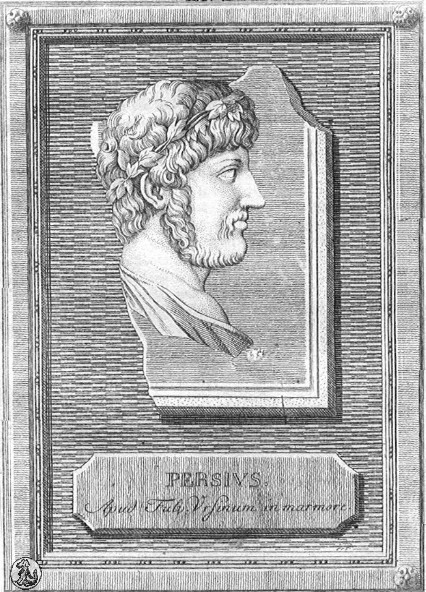Frases célebres de Persio
“No busques fuera de ti mismo.”
Original: "Ne te quaesiveris extra".
Fuente: Cita de entrada en el libro de R. W. Emerson: Confianza en uno mismo. Ed. Gadir. Madrid, 2009. Extraídas del Libro 1, línea 7, de sus Sátiras".
“Tu sabiduría vale tanto como nada si nadie sabe cuánto es tu saber.”
Fuente: Valdés, Luis. Gastiburu: el santuario vasco de la Edad del Hierro y el territorio cariete del oppidum de Marueleza, Volumen 1. Bibliotheca Archaeologica Hispana. Editorial Real Academia de la Historia, 2009. ISBN 9788496849488. p. 9.
Persio: Frases en inglés
“None, none descends into himself, to find
The secret imperfections of his mind.”
Ut nemo in sese tentat descendere! nemo!
Sed praecedenti spectatur mantica tergo.
Satire IV, line 23 (translated by John Dryden).
The Satires
“That master of arts, that dispenser of genius, the Belly.”
Magister artis ingenique largitor<br/>venter.
Prologue, line 10.
The Satires
“O but it is a fine thing to have a finger pointed at one, and to hear people say, "That's the man!"”
At pulchrum est digito monstrari et dicier "hic est".
Satire I, line 28.
The Satires
“Is all your knowledge to go so utterly for nothing unless other people know that you possess it?”
Usque adeone<br/>scire tuum nihil est, nisi te scire hoc sciat alter?
Usque adeone
scire tuum nihil est, nisi te scire hoc sciat alter?
Satire I, line 26.
The Satires
“But when to-morrow comes, yesterday's morrow will have been already spent: and lo! a fresh morrow will be for ever making away with our years, each just beyond our grasp.”
Cum lux altera venit,<br/>iam cras hesternum consumpsimus; ecce aliud cras<br/>egerit hos annos et semper paulum erit ultra.
Cum lux altera venit,
iam cras hesternum consumpsimus; ecce aliud cras
egerit hos annos et semper paulum erit ultra.
Satire V, line 67.
The Satires
“Let them recognize virtue and rot for having lost it.”
Virtutem videant intabescantque relicta.
Satire III, line 38.
Alternate translation (by William Gifford):—
"In all her charms, set Virtue in their eye,
And let them see their loss, despair, and—die!"
The Satires
“Our life is our own to-day, to-morrow you will be dust, a shade, and a tale that is told. Live mindful of death; the hour flies.”
Nostrum est<br/>quod vivis, cinis et manes et fabula fies.<br/>vive memor leti, fugit hora.
Nostrum est
quod vivis, cinis et manes et fabula fies.
vive memor leti, fugit hora.
Satire V, line 151.
The Satires
“Who’ll read that sort of thing?”
Quis leget haec?
Satire I, line 2 (translated by W. S. Merwin).
The Satires
“The man who wishes to bend me with his tale of woe must shed true tears – not tears that have been got ready overnight.”
Nec nocte paratum,<br/>plorabit qui me volet incurvasse querella.
Nec nocte paratum,
plorabit qui me volet incurvasse querella.
Satire I, line 90.
The Satires
“Don’t consult anyone’s opinions but your own.”
Nec te quaesiveris extra.
Satire I, line 7.
The Satires
“Live with yourself: get to know how poorly furnished you are.”
Tecum habita: noris quam sit tibi curta supellex.
Satire IV, line 52.
The Satires
